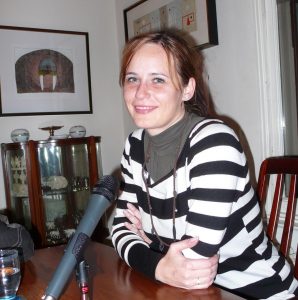February 12, 2013
By Eszter Szenczi, PhD student, Budapest
 The “Thinking Canada” study tour is a unique program that selects 30 graduate students of different educational background from European Union member countries to come together and gain firsthand experience of Canada. In 2012 it was organized for the third time and I was among the lucky ones who could participate in it.
The “Thinking Canada” study tour is a unique program that selects 30 graduate students of different educational background from European Union member countries to come together and gain firsthand experience of Canada. In 2012 it was organized for the third time and I was among the lucky ones who could participate in it.
Why was the “Thinking Canada” Study Tour such an extraordinary opportunity for me? The answer is simple: I decided to engage in Canadian studies at an early age as I have always been fascinated by Canada’s openness to cultural diversity, especially considering its immigration and refugee policies at times of crises. So at college I studied English and French in order to become fluent in Canada’s two official languages. Then at university I specialized in Canadian studies and deepened my knowledge in Canadian culture, history, and literature. After getting my MA degree, I started the PhD program at Eötvös Loránd University because I developed a special interest in the unique situation of the Métis in Canadian society. Since 2009 I have been presenting my research results at conferences and in papers but they were restricted to my reading experience, which had never been tested by reality. My academic work is priceless but needs to be complemented by and completed with practicality and personal involvement. That is why this tour was an enormous help for me. When I first saw the announcement of the tour, I knew immediately that it was created for me.
We started off on the tour at the beginning of September and spent three days in Brussels to attend lectures mostly about EU-Canada relations. It was useful as this introduction prepared us for what we were going to hear and face in Canada. After this short but intensive course, we travelled to six Canadian cities (Ottawa, Quebec, Montreal, Toronto, Victoria, and Vancouver) in three different provinces to learn about the Canadian cultural, social, political, economic, and linguistic situation.
The programme of the “Thinking Canada” Tour is always created to offer something valuable to all the participants however different their background knowledge and experiences might be. We visited governmental and non-governmental organizations, met numerous prominent figures in many areas of life, and learned about aspects of the country without which our understanding of Canada and the EU-Canada relations would not be complete. We could ask any and all questions that arose, exchange views, and interact with specialists. The visits and meetings opened our eyes to many current political, economic, linguistic, and cultural issues that we might not have appreciated from just sitting in a classroom in our respective countries.
For me, as a teacher and researcher of literature, the tour gave insight into the intriguing blend of American and British English used in Canada, the country’s gorgeous landscapes, some of the most striking habits of the local people and the current challenges they need to face, such as the unsolved question of the Indian Act affecting the lives of thousands of Indigenous people. Apart from the information related to my academic field, I also learned about Canada’s recent political, economic, and environmental issues which have influence –directly or indirectly – on the subject matter of my dissertation.
By selecting thirty people from the EU member countries we could also meet students from all over Europe. We had many thought-provoking discussions and could compare not only Canada with Europe but also our own distinct European experiences. These talks greatly contributed to the broadening of our general knowledge on Canada, Europe, and the whole world too. Several new friendships were created, future collaborations established and we had a wonderful month together.
After the tour, nine of the students could undertake a two-month internship in a number of Canada’s organizations to gain some personal working experience. Thanks to the generous support of the Canada-Hungary Educational Foundation (CHEF), one of the interns on the tour is always from Hungary. I was selected to intern for the Canadian Conference of the Arts where I was exposed to how this long-standing art organization works and lobbies at a difficult time of financial cuts. Unfortunately however, by the end of October, it could not find alternative sources to maintain itself any more, and had to close its doors. Within a couple of days, I needed to find another placement to finish my internship. Luckily again, with the help of CHEF, I managed to obtain a researcher position at the Canadian Museum of Civilization for the remaining month. Here I became part of a team working on an upcoming exhibition exploring issues of identity and culture of urban Indigenous people through a variety of art forms. This internship opportunity provided me with work experience related directly to my research – and in a wonderful setting!
I hope that the tradition of the “Thinking Canada” Study Tour and Internship will live on. I feel lucky to be among the participants who were selected and had the chance to discover many of Canada’s distinctive characteristics as well as to contribute to and benefit from this internship. Although some drastic financial cuts have been introduced by the Canadian government to previously existing Canadian studies and exchange programs, I hope that many other students from Europe can grasp the advantages of the exceptional Canadian multiculturalism policy. Studying and learning from the similarities and differences between Europe and Canada have will surely open our eyes to new perspectives.
